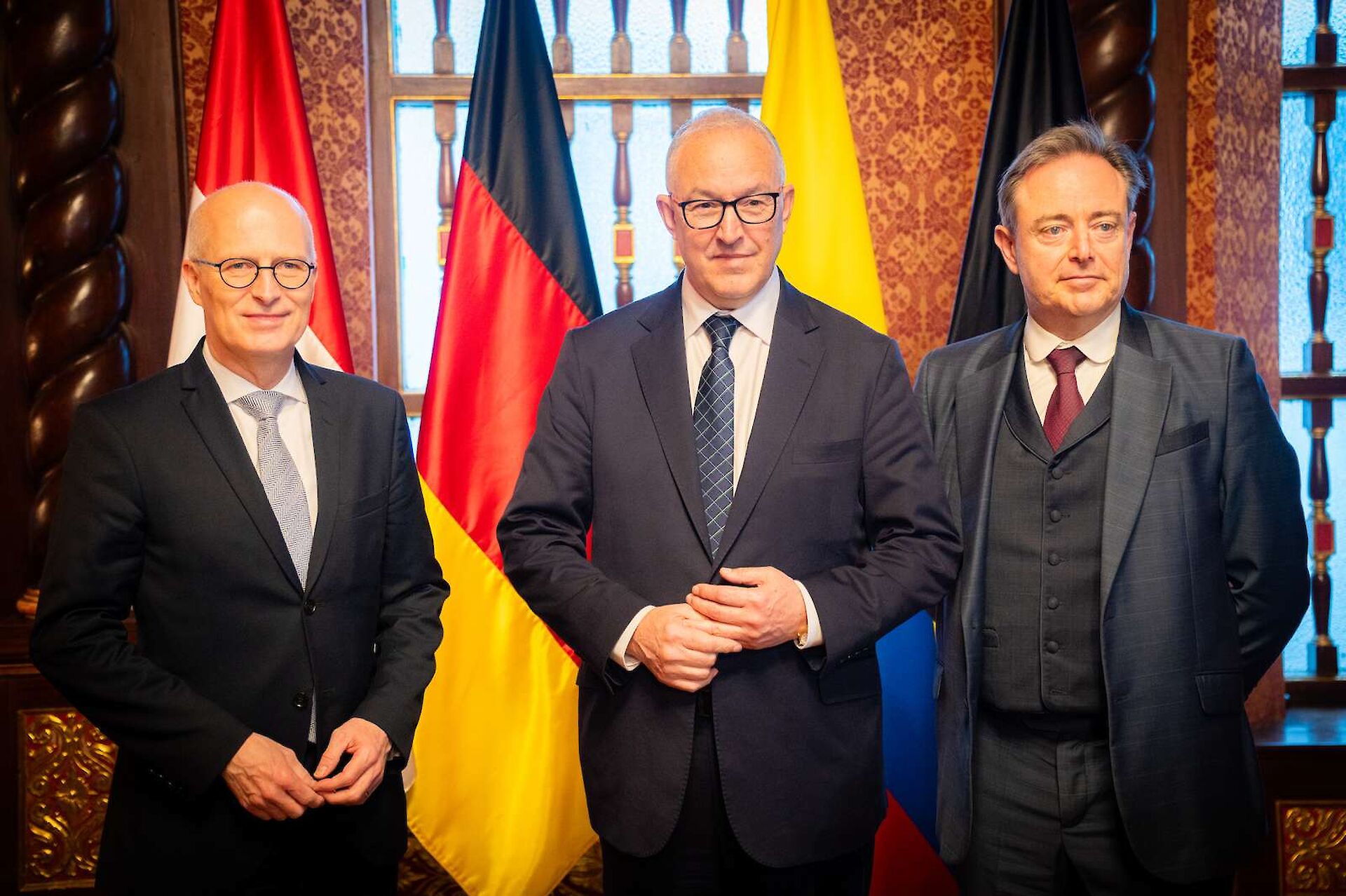

31 Jan 2024 16:00 Economy
Hamburg, Rotterdam, and Antwerp are determined to enhance their efforts against the illegal import of drugs through their ports and the associated organized crime. Hamburgs mayor Dr. Peter Tschentscher, along with his counterparts Ahmed Aboutaleb (Rotterdam) and Bart de Wever (Antwerp), traveled to Colombia this week for discussions with the government and to establish contacts with local security authorities. The mayors are accompanied by a delegation of forty representatives from German, Dutch, and Belgian customs, security, and port authorities. Two-thirds of the world's cocaine is produced in Colombia, and the drug is smuggled to Europe and other destinations via various South American ports.
The delegation was welcomed to the capital, Bogotá, on Monday by Acting Foreign Minister Francisco Coy for a conference at the Ministry of Foreign Affairs. The conference was also attended by the Minister of Trade, the Deputy Ministers of Justice, Criminal Policy, Defence and Security, and the heads of the Colombian Navy and National Police.
The Colombian government outlined the dramatic impact of drug-related organized crime on the country and described its drug policy strategy. The Colombian military and police leadership reported on the extensive measures already in place to combat drug trafficking and expressed their willingness to cooperate directly with the ports of Hamburg, Rotterdam, and Antwerp. At the same time, the Colombian side appealed to international responsibility in the fight against global drug trafficking and called for a more consistent approach to combating drug consumption in European countries and for increased security measures.
Additionally, the delegation's security experts held talks with anti-drug units from the police, customs, public prosecutor's office, and the military. Colombia is utilizing the latest technology to combat drug trafficking, sometimes at the risk of the lives of police officers.
A joint conference was also held with the port authorities of Colombia, Peru, and Ecuador, where high-level port representatives exchanged views on security measures and improved international cooperation.
On Monday, at the invitation of the German, Dutch, and Belgian embassies, the mayors met with the head of the United Nations Office on Drugs and Crime (UNODC) in Colombia. She described the dramatic consequences of organized drug crime for the population in the coca-growing regions. Armed gangs spread oppression and violence, force the cultivation of coca plants, and prevent the development of a legal economy that could offer people better prospects for the future.
On Tuesday, the mayors visited the port city of Buenaventura, where they met with the navy's coastguard, the chief of the port police, and the director of the port authority.
First Mayor Dr. Peter Tschentscher stated, "The recent significant increase in cocaine imports via German seaports is an alarming sign. Developments in Rotterdam and Antwerp have shown that growing drug consumption and drug smuggling via the ports go hand in hand with a dangerous expansion of organized crime as a whole. We must prevent this in Hamburg. That is why we reacted early, cooperated with the authorities in Rotterdam and Antwerp, and are now extending the security network of the major European port cities to include cooperation with authorities and ports in Colombia. In Bogotá and Buenaventura, we gained a lot of new information, established contacts for our port and security authorities, and agreed on direct cooperation. In Germany, too, we need to improve the technical monitoring of ports, terminals, ships, and containers. Only a determined fight against internationally organized drug crime can save us from a development that has already taken place in the Netherlands and Belgium. I have agreed with my counterparts in Rotterdam and Antwerp that we will continue our practical cooperation, draw up a joint report on our trip to Latin America, and submit it to our national governments and the European Commission."
Background: Combating drug-related crime
According to the United Nations Office on Drugs and Crime (UNODC), Colombia is accountable for two-thirds of the world's cocaine production, with Europe being one of the primary markets. In 2023, the port of Antwerp alone seized 116 tonnes of cocaine, surpassing the 59 tonnes seized in the Netherlands. During the launch of the European Ports Alliance last week, the Federal Ministry of the Interior revealed that Germany had seized 35 tonnes of cocaine the previous year, with the majority intercepted at the port of Hamburg.
In Hamburg, the battle against drug-related crime is a closely coordinated effort between customs and the Hamburg police, particularly within the "Joint Narcotics Investigation Group." To fortify the security of the Hamburg port and enhance the effectiveness of combating drug-related crime, the "Hamburg Port Security Alliance" was established at the previous year's Hamburg Port Security Summit. The alliance formulated a comprehensive package of measures. Its members include federal and Hamburg authorities responsible for port security (specifically the Federal Ministry of the Interior and the Interior Affairs, the Federal Ministry of Finance, the Federal Criminal Police Office, the Customs Administration, the Ministry of the Interior and Sport, the Ministry of Economic and Labour Affairs, the Hamburg Port Authority, and the Hamburg Police), along with representatives from the port industry and shipping.
Beyond the effective collaboration among security authorities in Germany, the Netherlands, and Belgium in detecting and prosecuting drug-related crime, the ports of Hamburg, Rotterdam, and Antwerp exchange strategic information to enhance port security through the Port Security Steering Committee. This collaboration focuses on the consistent implementation of the International Ship and Port Facility Security Code and container security.
Hamburg, Rotterdam and Antwerp have vowed to fight illegal drugs imported through their ports.
Senate Press Office
Phone: 040 42831 2242
E-Mail: pressestelle@sk.hamburg.de